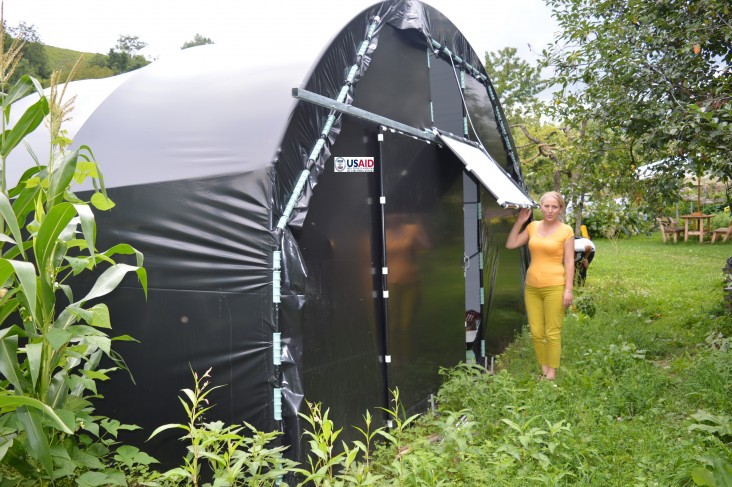
January 2017—In Sylhane Ramadani’s village of Gotovushë/Gotovuša, flowers are as much about giving as they are about getting.
Villagers in this multiethnic and mountainous corner of southern Kosovo still gift garden-grown blossoms to friends and neighbors. Increasingly, however, women farmers are growing, processing and selling the flowers to aggregators for export to Europe. As a result of the sales, women farmers in this heavily rural region receive much welcomed additional income.
“We have come to realize that we should be selling what we grow, and we can be making real profit from our work,” says Ramadani, 45. “Why give away for free what I work to grow, when I can secure an income for my family?”
For years, women in the region have collected wild-harvested and homegrown medicinal herbs, including mallow. The flower is a common ingredient in many shampoos, face creams and skin lotions. When sold fresh, the flowers had poor margins, selling for roughly 1 euro per kilogram.
To improve the situation, USAID, through its Agricultural Growth and Rural Opportunities (AGRO) program, supplied 50 women farmers with simple solar drying tunnels in July 2016. The tunnels resemble a greenhouse with black plastic film walls. The black plastic absorbs the sun’s rays, which heats the interior, accelerating the drying process. Multiple shelves furnish each tunnel with 645 square feet of drying space.
It takes just three to four days to dry mallow flowers. “All the buyer needs to do is to immediately package them and prepare them for export,” explains Ramadani.
The value added by drying translates into much healthier margins. The women can sell dried flowers for over 5 euros per kilogram, says Samir Riza, a medicinal and aromatic plant expert with USAID’s agricultural activities.
“The mindset has really changed in our villages,” says Ramadani, who leads a local multiethnic women’s cooperative. “Women are more confident—they are now working, growing, collecting, drying and selling their goods for profit.”
USAID’s intervention has provided more than 32,000 square feet of drying capacity to the region. In addition to mallow seeds, the women farmers received marigold, cornflower and ornamental sunflower seeds. The crops can all be farmed intensively, an advantage for local women who tend small and fragmented plots. The women were also trained in crop management, including how to pick delicate blossoms without harming them.
A local firm, Agroprodukt Sh.P.K., buys nearly everything the women grow and dry, exporting the crops on to Austria, Germany and Switzerland.
Each season, the dried flowers and other herbs earn women farmers about 300 euros—an amount approaching the nation’s average monthly wage. The process is part of USAID’s efforts to develop Kosovo’s medicinal and aromatic plant industry, and to increase incomes among Kosovo’s majority rural population.
“This is additional income for our families, and that is welcomed by the whole household,” Ramadani says. “In the near future, we expect an increase in cultivation, wherever we have land available, an increase in wild collection, and ultimately an increase in sales and profits.”
USAID’s AGRO program, which runs from 2015 to 2020, is designed to enhance the sustainability and competitiveness of targeted Kosovar agribusinesses in domestic and export markets by increasing agricultural productivity and marketability.
LINKS
Follow @USAIDKosovo, on Facebook, on YouTube







Comment
Make a general inquiry or suggest an improvement.